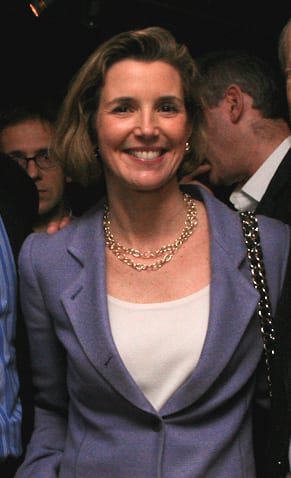What is Success In Relationships and Life?
 She was one of the most powerful women on Wall Street and named to Time’s 2002 list of “Global Influentials” and Fortune’s Most Influential Person Under the Age of 40.
She was one of the most powerful women on Wall Street and named to Time’s 2002 list of “Global Influentials” and Fortune’s Most Influential Person Under the Age of 40.
She made a name for herself as head of Merrill Lynch’s global wealth management division.
In spite of leading the division to $3.1 billion in profits during her two years as president of the wealth management unit, in 2011 her job was eliminated.
Sallie Krawcheck was given 20 minutes from the time she was told, until the announcement went out.
Crushed, she took time off to heal and be with her family.
She went on to purchase a professional women’s organization called 85 Broads.
Would you still consider her a success?
Is she now less successful having time to spend with her family and running an organization to help women?
How Do I Compare?
We are constantly trying to compare ourselves to see how we measure up to those around us.
Is that guy is taller than me?
She may be smarter, but I’m prettier.
I wonder how much money Jim makes and if his wife is having an affair.
I wish my boss acknowledged me like he does with Steve.
Comparison and the drive for status is deep-rooted in our nature and that’s unlikely to change any time soon.
But what we can change is the basis of those comparisons.
What Measurement Are You Using?
I don’t make as much money as most executives in the fast food industry.
So you could say I am less successful than they are.
 And in truth, if you looked at their lifestyle and put me next to one on an airplane, at a business conference or in expensive restaurant, it could reinforce my inferiority.
And in truth, if you looked at their lifestyle and put me next to one on an airplane, at a business conference or in expensive restaurant, it could reinforce my inferiority.
Mr. VP of McDonalds is probably sitting in First Class. Whereas I can be found crammed in economy between a guy who snores and a lady who talks too much.
But I make a living helping people transform their lives, while Mr. VP up in first class is making our country sicker and fatter.
So, first class seat or not, I feel like I have a leg up on him.
How You Choose To Measure Success
So I may not measure my success by the amount of money I have in the bank.
I prefer to measure success based on people’s social and global impact.
I admit that is absolutely totally biased.
Here’s the point: You get to choose how you THINK about your success.
We don’t learn this in school or even from our parents.
In fact, most of our societies measures of success is based on rules we are all expected to buy into and follow.
Make lots of money.
Go to church.
Buy lots of stuff to look and feel good.
Get married. Have kids.
Nothing Is Absolute
The truth is we don’t have to limit ourselves to other people’s opinions or values.
Sure having money is nice, but you can choose to use it as a tool to achieve true wealth and satisfaction.
For some religion may give you moral direction, but you don’t have to follow a religion to be a good and moral person.
Sure relationships and family are important, but not being in a relationship or having kids doesn’t make you any less valuable as a person.
The good and the bad news is we’re all so different and we all think differently and we get to choose what makes us successful or not.
How Will You Measure Your Life?
 For some it is success in dating…
For some it is success in dating…
I work with a lot of men and women who have very poor metrics or measurements for success in their romantic lives.
They want to judge their “success” based on how often they date, how attractive their date is, if they have sex.
It’s no coincidence that these people with these yardsticks are typically the same ones who struggle in relationships.
I might ask them, for instance:
“Let’s pretend you had a choice to date someone who is incredibly good looking, but is immature and boring or someone who is average-looking physically, but you are always happy when you are around them. Which would you choose?”
Or
“What would you rather marry someone who you deeply love or someone who makes a lot of money?
The answers may seem obvious to you or they may not.
Clients who have an unhealthy fixation on looks or wealth experience a lot of cognitive dissonance when trying to answer these hypothetical “would you rathers.”
Are The Kardashian’s “Successful?”
I used to play “would you rather..” with my son all the time.
So let’s play it with some that apply to other areas of your life…
 “Would you rather have a career you hate and make lots of money or make an average income and do something you love?”
“Would you rather have a career you hate and make lots of money or make an average income and do something you love?”
“Would you rather be famous for something that doesn’t matter (like, being on a reality TV show) or be unknown and work on something that is deeply important to you?”
Or for those of you who feel like they always need to be dating somebody:
“Would you rather be in a toxic relationship or be alone and emotionally healthy and happy?”
These “would you rather” hypotheticals are powerful tools because they can show you what your true measurement of success is.
What Makes You Happy?
The truth is we all want to be driven by happiness and meaning, but it is easy to get caught up in unnecessary status concerns and superficial comparisons.
 For instance, let’s say you decide that playing video games for 12 hours per day (because you have made enough money so you don’t have to work) is your life’s ultimate purpose and measure of success.
For instance, let’s say you decide that playing video games for 12 hours per day (because you have made enough money so you don’t have to work) is your life’s ultimate purpose and measure of success.
However, within a few months you’ll find yourself fat, lonely and miserable (and successful).
If you decide becoming the most infamous jewelry thief is your definition of success, then you may find yourself in jail or shot.
Your metrics of success leads to your long-term real life consequences and they determine how you think and feel about your life.
Would You Rather…
If you create some hypothetical either/or’s or “would you rather” situations, it can quickly help you sort out your real priorities.
It could be…
I’m not famous, but I improve people’s lives. That makes me successful.
You’re single and alone right now, but you’re happy and proud of yourself. That makes you successful.
I challenge you to take a moment and set up some “would you rather” hypotheticals for some of your biggest drives and desires in your life and see what answers comes up.
 What you’ll notice is that shifting your external measurements of success and into internal states of happiness and meaning will lead to a much more purposeful and happy life.
What you’ll notice is that shifting your external measurements of success and into internal states of happiness and meaning will lead to a much more purposeful and happy life.
If you need help getting perspective on your measurements of success, click here to set up a complimentary clarity session.








0 Comments